
Yeah. I'll be the first to raise my hand in this class and say that forgiveness is a process. What I mean by that is, whether you choose to forgive someone while looking them dead in the eye, while journaling at home or while standing at the foot of an altar, rarely do you say the words, "I forgive you" and, immediately following, everything is fully resolved. Or healed. When you decide to forgive someone via your words, it is basically like making a public declaration that you are going to put yourself on the path to, as the dictionary definitions of the word state— "to grant pardon for or remission of (an offense, debt, etc.)"; "to cease to feel resentment against and absolve (to cancel an indebtedness or liability of", or "to set free or release, as from some duty, obligation, or responsibility)".
Pardon. Not resent. Release. Hmph. No wonder so many mental health professionals say that when we choose to forgive a person, it's far more for our benefit than it is for theirs; that to choose (because it is always a choice) to hold onto the fallout of our experiences is holding us back, stressing us out and, according to many reports, even making us sick. No joke. There are studies that reveal unforgivingness can keep you in a state of anger and raise your blood pressure. Unforgivingness can also increase levels of depression and PTSD. Shoot, unforgivingness can even cut your lifespan short. And really, y'all, is holding a grudge really worth all of that?
That's why I wanted to take out a few minutes of your time to first say, if you know there is someone you need to forgive, for your own health and well-being, please consider doing so. And second, if you're reading this and you someone who hurt you, offended you and/or totally pissed you off immediately comes to mind, just to make sure that you're as free from the situation as you may believe that you are. You can do this by going down this checklist of signs that a person isn't as good at forgiving as they might think that they are.
Why Is Forgiving So Hard to Do?
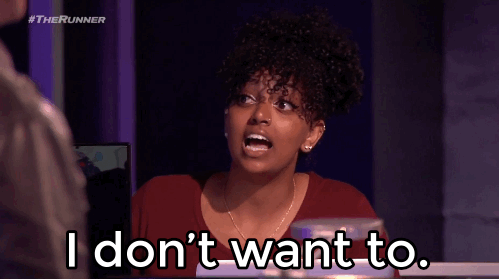
Since most of us know that bestowing forgiveness is essential in life (because none of us is perfect, right?), why is it that so many of us seem to struggle so much with forgiving others? In a good article that I read on the topic, the author brought up three good points. A lot of us don't forgive others because 1) we don't want the "offender" to think that what they did was OK; 2) we don't think that the person who hurt us deserves forgiveness, and/or 3) we don't trust them. Thanks to my own forgiveness journey, what I have learned is, far too often we are hesitant or even afraid to forgive someone because we think that forgiveness and reconciliation are one in the same, when that is not even remotely the case.
You forgive as a way to heal from the hurt or harm that was done to you. You also forgive in order to release yourself from the temptation to keep the cycle of pain going by hurting or harming the other person (or someone else because you are still holding onto unforgivingness).
Reconciliation is another matter entirely. If it is even on the table for discussion, the offender has some work to do in order to restore what has been lost (and if they are truly sorry, they are all for putting the sweat equity in with their words and actions—no question about that). So no, never feel that just because you have forgiven someone that you are invalidating your feelings about the offense or that you have to have the same kind of relationship with them moving forward. Forgiveness isn't designed to make you more vulnerable; it's actually meant to empower you by helping you to let the pain, fear and frustration go.
Now, with all of this out of the way, here are some pretty telling signs that you're not as good at forgiving as you probably need to be.
1. You Don’t Really Ever Let Things Go
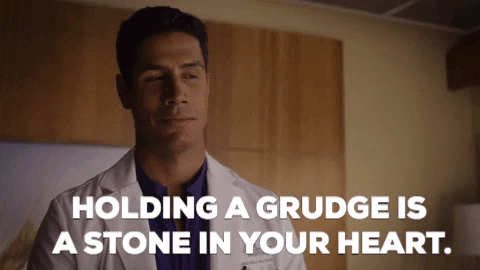
Something that I deal with a lot in marriage counseling are people who forgive with their mouths but not necessarily via their actions. What I mean by that is, although one spouse will claim that they've forgiven their partner for something that they've done, the moment they do something else that they don't like, the past issue comes up. It's almost like they hold onto it like a trump card to use in an argument in order to "win" it. Nothing healthy comes out of it because really, who wants to constantly hear about their past missteps and mishaps all of the time?
Say that you are married, your husband misspends some money and it caused a check to bounce. You talk it through and then tell yourself and him that you are willing to let it go. But then he forgets to pay a different bill five months later and you bring his misspending from before up, even though these are the only times in recent history that it has happened. This is a good example of not being able to let things go.
If your man really isn't the best with money, perhaps it's time for you to handle the finances or for you guys to get a financial consultant. But to berate him every time he does something, even though you claim you've forgiven him, means that you actually didn't. Not only that, but the more that you "stockpile" his mistakes, the harder it will be to get past a challenge or problem the next time one comes up.
Interestingly enough, this is one of the reasons why a lot of couples end up divorcing after 20 years of marriage; they never really forgave each other for much of…anything really. And you know what they say—eventually a collection of snowflakes end up turning into a huge avalanche.
2. You Take “Forgive but Don’t Forget” Totally Out of Context

One time, I heard a guy named Cedric Dent say something about forgiveness that I think is pretty good. He used the hypothetical example of him telling someone something in confidence, them turning around and telling other people, and then them ultimately asking for forgiveness for the betrayal. According to Cedric, the best way to handle an instance like that is to forgive the person, but to also not tell them any more secrets for a while. It's not because you are holding things over them; it's actually their actions have shown that they have a weakness when it comes to respecting someone else's privacy.
I think this is the healthy way of applying the old adage "forgive but don't forget". You're not "not forgetting the offense" in order to weaponize the offender with it later up the road. You're using it as a teachable moment so that you can do all that you can to prevent being in a similar situation again. It's not about holding something over a person; it's about making sure that you apply wisdom in the future. No more, no less.
That said, forgiving while not forgetting shouldn't be about not being open to giving someone another chance. It's simply about asking yourself, "What did I learn from this experience?" and then applying it across the board. For instance, if someone revealed one of your secrets, what's the lesson? Perhaps it's something as simple as learning how to vet people better in the future. "Not forgetting" should be more about how the situation can make you better rather than how to make someone feel like they cannot be redeemed for what they have done. If you've truly forgiven them, sometimes they can be—once trust has been restored. It's close to impossible for that to happen if you're holding onto the out of context take of "forgive but don't forget".
3. You Lack Empathy in the Forgiving Process

I remember when I got my first abortion and a "friend" that I went to school with, who was a virgin at the time, told me that I was going to go to hell for it. Fast forward to her having a late period two years later and—surprise, surprise—she was asking me what clinic I went to for my procedure.
Yeah, it can be really easy to think that someone is not worthy of your forgiveness—or forgiveness, in general—when you haven't done anything similar to what they did to you (or you have selective memory when it comes to some of the past things that you have done). But we've all done something that some human, somewhere, would deem "unforgivable". Not only that but, if a lot of us were truly honest with ourselves, the reason why we don't extend the forgiveness is because, on some cryptic level, we want to have some sort of power over the person who offended us.
I can speak from very up close and personal experience that the sooner you bring empathy—" the power of understanding and imaginatively entering into another person's feelings"—into play, the sooner your heart will soften to a situation; any situation, really. Try it.
4. You’re Stuck in the Past
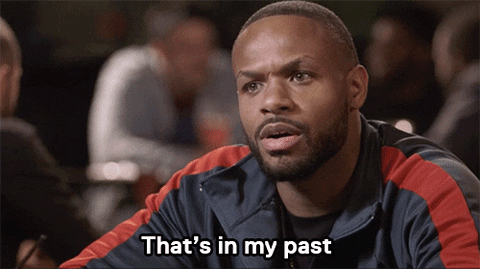
An author by the name of Criss Jami once said, "Grudges are for those who insist that they are owed something; forgiveness, however, is for those who are substantial enough to move on." Now put a pin in that as we touch on the main points from the article, "8 Signs You Have NOT Forgiven Someone", the author shares some of the following points.
Here's how to tell if you still need to do more forgiveness work. When you:
- Use what the person said or did as a topic of conversation.
- Daydream about getting revenge or some kind of justice. A good example of this is attending your high school reunion and showing them.
- Preoccupy your mind day in and day out either reliving or dwelling on the situation or the person's behaviors.
- Get annoyed if someone even mentions the person.
- Have a tendency to avoid the person.
- Are secretly delighted to hear about the person's current difficulties and losses.
- Strongly believe you have been unfairly treated and are an innocent victim.
- Have friends and family that are tired of talking about the person and the latest drama.
In another article on forgiveness, the author said this:
"…forgiveness brings the forgiver peace of mind and frees him or her from corrosive anger. While there is some debate over whether true forgiveness requires positive feelings toward the offender, experts agree that it at least involves letting go of deeply held negative feelings. In that way, it empowers you to recognize the pain you suffered without letting that pain define you, enabling you to heal and move on with your life."
Something that a lot of us refuse to acknowledge or accept about forgiveness is that it can keep us mentally, emotionally and relationally stagnant. Here's an example. Back when I was dating my late fiancé, it took for-e-ver to let him fully into my heart and life because my first love had done so much emotional damage. Looking back, I stand amazed by how much my fiancé was able to tolerate me bringing up my ex or sometimes even comparing the two of them. By the time I finally did let my guard down, Damien (my fiancé) died just a few months later.
That's the thing about unforgivingness. In order to remain in that head and heart space, you have to keep thinking and looking backwards. And that is what can prevent you from truly moving forward. Hmph. The real "ouch" about that is while you're still stuck in your past, there's a pretty good chance that your offender…isn't. They are moving right along.
5. You Think That Karma Is YOUR Job
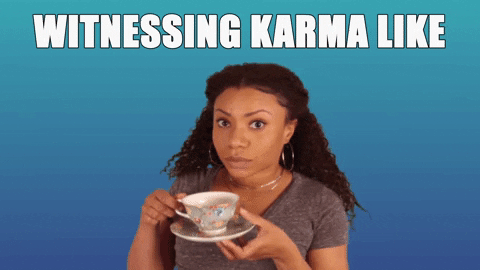
If you hop on Google, put "karma quotes" in the search field and then click on the "images" tab, you'll see a slew of karma references. Two that cracked me up were "Karma's just sharpening her nails and finishing her drink. She'll be with you shortly" and "In the end, karma will be a bigger bitch than I'll ever need to be". Two that had me like "hmm" were "Karma isn't a bitch, it's a mirror" and "You will never understand the damage you did to someone until it's done to you; that's why I'm here. Signed, Karma." But the quote that all of us should keep in mind as it relates to forgiveness is the one by Dr. Wayne Dyer—"How people treat you is their karma. How you react is yours." (Louder for the seats in the back, please.)
Although most of us consider karma to be "what goes around comes around", did you know that another definition of the word is "destiny" or "fate"? I can personally attest to the fact that karma has a way of handling what someone has done (ourselves included) in a way that we couldn't even begin to come up with on our own. Plus, when we let karma do its thing without trying to help it along, we avoid reaping seeds of bitterness, resentment and revenge.
Along these same lines, the Bible tells us that we reap what we sow (Galatians 6:6-10). What's really a trip about that Scripture is it doesn't put an expiration date on when that reaping will happen. The warning here is that you only waste time and bring unnecessary drama into your own life if you think it's better to be the "karma bestower" rather than forgiving someone. What's really crazy is, by trying to do karma's job, you keep the vicious cycle going—and usually end up doing further harm to yourself. (Something that unforgiveness knows will happen, by the way.)
Bonus: If You’re a Christian, You Don’t Factor in Just How Much You Need to Forgive
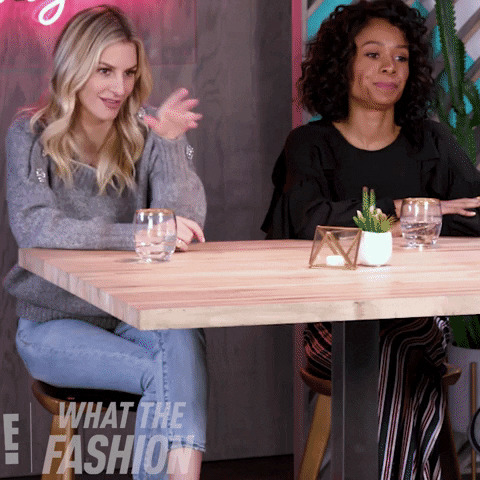
If you're a Christian (or you're simply someone who tries to apply biblical Scripture to your life as much as possible), I think it's imperative that I end this article on forgiveness on a particular note. Matthew 6:14-15(NKJV) tells us, "For if you forgive men their trespasses, your heavenly Father will also forgive you. But if you do not forgive men their trespasses, neither will your Father forgive your trespasses."
What this basically means that in order to be forgiven by God, we need to forgive those around us. It's a Scripture that actually keeps me pretty humble because it reminds me that just like I need to forgive others for what they've done, there is stuff that I do that I need to be forgiven by the Most High for; that nothing should keep me from wanting to live a free and forgiven life so that, at the very least, I can spiritually thrive as an individual.
True forgiveness ain't easy. Not by a long shot. But if you really want to evolve and heal as an individual, it's important that you do it. Not the "bad way" (you know, saying that you do even if you don't really mean it); the right way. Hopefully this article helped to point you in the direction of just that.
Forgive. So that your karma will bring forgiveness unto you. Amen. So be it, sis.
Want more stories like this? Sign up for our newsletter here and check out the related reads below:
How I Learned To Forgive People In My Life That Weren't Sorry
Jada Pinkett Smith Reminds Us Forgiveness Isn't About The Other Person
Why I Don't "Cut People Off" Anymore, I Release Them Instead
Feature image by Shutterstock
- When Forgiving Yourself Is the Hardest Kind of Forgiveness ... ›
- Can You Ever Forgive Me? review – horribly hilarious odd-couple ... ›
- Read This If There's Someone You Can't Forgive | Thought Catalog ›
- 5 Ways to Help Yourself Get Over a Big Mistake | Inc.com ›
- How to Forgive Someone Who Has Wronged You ›
- How Do You Forgive Even When It Feels Impossible? (Part 1 ... ›
- How To Forgive Someone Who Has Hurt You: In 15 Steps ›
- Why You Don't Always Have to Forgive | Psychology Today ›
Exclusive: Viral It Girl Kayla Nicole Is Reclaiming The Mic—And The Narrative
It’s nice to have a podcast when you’re constantly trending online. One week after setting timelines ablaze on Halloween, Kayla Nicole released an episode of her Dear Media pop culture podcast, The Pre-Game, where she took listeners behind the scenes of her viral costume.
The 34-year-old had been torn between dressing up as Beyoncé or Toni Braxton, she says in the episode. She couldn’t decide which version of Bey she’d be, though. Two days before the holiday, she locked in her choice, filming a short recreation of Braxton’s “He Wasn’t Man Enough for Me” music video that has since garnered nearly 6.5M views on TikTok.
Kayla Nicole says she wore a dress that was once worn by Braxton herself for the Halloween costume. “It’s not a secret Toni is more on the petite side. I’m obsessed with all 5’2” of her,” she tells xoNecole via email. “But I’m 5’10'' and not missing any meals, honey, so to my surprise, when I got the dress and it actually fit, I knew it was destiny.”
The episode was the perfect way for the multihyphenate to take control of her own narrative. By addressing the viral moment on her own platform, she was able to stir the conversation and keep the focus on her adoration for Braxton, an artist she says she grew up listening to and who still makes her most-played playlist every year. Elsewhere, she likely would’ve received questions about whether or not the costume was a subliminal aimed at her ex-boyfriend and his pop star fiancée. “I think that people will try to project their own narratives, right?” she said, hinting at this in the episode. “But, for me personally – I think it’s very important to say this in this moment – I’m not in the business of tearing other women down. I’m in the business of celebrating them.”
Kayla Nicole is among xoNecole’s It Girl 100 Class of 2025, powered by SheaMoisture, recognized in the Viral Voices category for her work in media and the trends she sets on our timelines, all while prioritizing her own mental and physical health. As she puts it: “Yes, I’m curating conversations on my podcast The Pre-Game, and cultivating community with my wellness brand Tribe Therepē.”
Despite being the frequent topic of conversation online, Kayla Nicole says she’s learning to take advantage of her growing social media platform without becoming consumed by it. “I refuse to let the internet consume me. It’s supposed to be a resource and tool for connection, so if it becomes anything beyond that I will log out,” she says.
On The Pre-Game, which launched earlier this year, she has positioned herself as listeners “homegirl.” “There’s definitely a delicate dance between being genuine and oversharing, and I’ve had to learn that the hard way. Now I share from a place of reflection, not reaction,” she says. “If it can help someone feel seen or less alone, I’ll talk about it within reason. But I’ve certainly learned to protect parts of my life that I cherish most. I share what serves connection but doesn’t cost me peace.
"I refuse to let the internet consume me. It’s supposed to be a resource and tool for connection, so if it becomes anything beyond that I will log out."

Credit: Malcolm Roberson
Throughout each episode, she sips a cocktail and addresses trending topics (even when they involve herself). It’s a platform the Pepperdine University alumnus has been preparing to have since she graduated with a degree in broadcast journalism, with a concentration in political science.
“I just knew I was going to end up on a local news network at the head anchor table, breaking high speed chases, and tossing it to the weather girl,” she says. Instead, she ended up working as an assistant at TMZ before covering sports as a freelance reporter. (She’s said she didn’t work for ESPN, despite previous reports saying otherwise.) The Pre-Game combines her love for pop culture and sports in a way that once felt inaccessible to her in traditional media.
She’s not just a podcaster, though. When she’s not behind the mic, taking acting classes or making her New York Fashion Week debut, Kayla Nicole is also busy elevating her wellness brand Tribe Therepē, where she shares her workouts and the workout equipment that helps her look chic while staying fit. She says the brand will add apparel to its line up in early 2026.
“Tribe Therepē has evolved into exactly what I have always envisioned. A community of women who care about being fit not just for the aesthetic, but for their mental and emotional well-being too. It’s grounded. It’s feminine. It’s strong,” she says. “And honestly, it's a reflection of where I am in my life right now. I feel so damn good - mentally, emotionally, and physically. And I am grateful to be in a space where I can pour that love and light back into the community that continues to pour into me.”
Tap into the full It Girl 100 Class of 2025 and meet all the women changing game this year and beyond. See the full list here.
Featured image by Malcolm Roberson
More Than Gratitude: 7 Signs You're Struggling With Contentment In Your Life
If Thanksgiving happens to be your favorite holiday — or you just happen to be a longstanding participant of it — then there is one tradition that you are probably familiar with. Usually, before everyone eats, each individual expresses at least one thing that they are grateful for. I actually think that is one of the best things about the holiday because it reminds people to slow down and really reflect on how to be in the moment and think about the blessings that they have. And that, my friend, is what gets folks into the mindset of knowing how to be…content — even if it’s just for a brief moment.
Contentment. By definition, it’s the state of not only being “satisfied with what one is or has” but also “not wanting more or anything else.” And you know what? Although it might not be a popular aspiration of many, it is a sign of spiritual maturity on certain levels. After all, it is the Apostle Paul who once said, “Not that I speak in regard to need, for I have learned in whatever state I am, to be content…” (Philippians 4:19 — NKJV).
Being content is about not complaining. Being content is about learning to be comfortable in your present circumstances. Being content is about choosing to find joy and fulfillment, on some level, and in some way, on a daily basis.
Personally, I dig all of this so much because when you have mastered true inner contentment, it creates stability, self-awareness, and a type of resilience that makes you…shoot, powerful beyond measure, if you ask me. Because when someone knows how to “find the good” and “make peace,” regardless of what is going on around them, they truly are unstoppable. Yeah, on so many levels, contentment is the ultimate life hack. It’s something that each and every one of us should aspire to become: completely and genuinely content.
Thanksgiving is basically moments away at this point. In preparation for that time of self-reflection, pour yourself a glass of wine, turn on some soft music, sit on your coach, and then ask yourself, “Am I content?” If you’re not sure (or you need the definition unpacked for you just a bit more), here are seven signs that you may not be…and yet, there is no time like the present to do something about it.
1. You’re Super Impatient
 Giphy
GiphyHonestly, putting another Scripture right here could be all that is needed in order to bring this point to a swift and abrupt end. Which one? I Corinthians 13, the Love Chapter, starts off with “Love is patient” (I Corinthians 13:4). Yeah, if you want to know if you love yourself and love yourself well, how patient are you…including with yourself? Throughout the years, I have shared one of my favorite definitions of "patient" in several different articles: “bearing provocation, annoyance, misfortune, delay, hardship, pain, etc., with fortitude and calm and without complaint, anger, or the like.” For me, it’s a blaring reminder that mastering patience isn’t just about waiting (more on that in a sec); it’s about waiting with grace.
Content people can do this because, on some level, they know how to apply the John Piper quote, "God is always doing 10,000 things in your life, and you may be aware of three of them." Another way of looking at this is people who can wait well — without complaining or getting annoyed by delays or challenges in the meantime — get that in order for things to truly come together, there are lots of moving parts…some that they don’t even know about. And so, if they want the best outcome, yes, waiting well is oftentimes not just involved; it is required.
Impatient people don’t get any of this. That’s why they are so stressed out all of the time.
2. You’re Worried About Things You Can’t Control
 Giphy
GiphyThis. Past. Election. Chile. And then the cabinet that that man is putting together as we speak? I don’t even want to get my blood pressure up, expounding on it. Let me just pivot by adding one more Scripture — because it is beyond fitting: “Therefore do not worry about tomorrow, for tomorrow will worry about its own things. Sufficient for the day is its own trouble.” (Matthew 6:34 — NKJV)
Although worrying is something that pretty much everyone does at one point or another, one of my favorite quotes on it is by an American humorist by the name of Erma Bombeck: “Worry is like a rocking chair: it gives you something to do but never gets you anywhere.” And really, when you stop to really think about worrying, isn’t that the truth? For one thing, all worrying does, by definition, is cause you to torment yourself by focusing on things that aren’t even going to happen (somewhere between 85-90 percent of the time, in fact; there is actually a science on that) or trying to control things that are beyond your control.
If being a worry wart is your internal struggle, my advice would be to look at life this way: If you’re worried that you’re about to get written up for getting to work late again, leave your house earlier — you can control that. On the other hand, if you’re worried that you’re going to get laid off before the holiday season ends, so long as you’ve been doing your best (which is also something that you can control), please put your energy elsewhere because that is something that you can’t control.
And I promise that when you choose to be calm and confident over worrying yourself to death, that can help you to manage what you can’t control so much easier. Oh, and your health will thank you, too, because worry is attached to things like insomnia, muscle tension, headaches, overeating, and drinking too much. All this over things that probably won’t happen in the first place? Yeah, sis…(choose to) relax.
And by choosing to chill out, there is some contentment that follows because you will see the good as much as, if not more than, the potential bad. Trust me.
3. The Past and/or Future Consume You
 Giphy
GiphyOn the heels of the Scripture that I just provided for the previous point, it also applies to this one. You know, back when I was doing some intentional research on forgiveness, I always appreciated the insight of author Gary Zukav: “Forgiveness is accepting that the past cannot change.” While this doesn’t mean that you shouldn’t hold people accountable for what they have done, it does help you to be compassionate with those who are truly sorry (check out “Heads Up: It's NOT An Apology If An Amend Isn't Made”) because, no matter what has transpired between you and them, one thing they can’t do is go back into a time machine and change it.
And you know what? When it comes to the mistakes — or, let’s be real, sometimes they are conscious poor decisions — you have made, you can’t either. So, why let their misdeeds or your own consume you to the point of internally destroying you?
Then there’s the future. What if you get robbed? What if your mom gets cancer? What if your husband files for divorce? Girl, if you are caught up in the future that hasn’t even happened yet, you are definitely gonna drive yourself up the wall! And this is why so many mental health experts and platforms are all about encouraging individuals to live in the moment. You can do this by meditating, taking breaks from social media (and the news), journaling, doing things that you enjoy (instead of waiting to put them off), and resting.
Listen, one of the best things about choosing to only focus on the here and now is you can find little things about it to be content with — and that helps you to be/become more content overall.
4. You Always Think About Wanting More
 Giphy
GiphyAlthough it certainly wasn’t my plan for this piece to be so Scripture-heavy, I’ve got to flow with what immediately comes to mind and, for this point, the verse, “So are the ways of everyone who is greedy for gain; It takes away the life of its owners” (Proverbs 1:19 — NKJV) is it. And just what does it mean to be greedy? A greedy individual isn’t just low-key obsessed with getting and having more — please catch it — they are also quite EAGER.
Eager folks also tend to be impatient. Eager folks are perceived by others as being very intense (and not in a good way). More times than not, eager folks haven’t really mastered how to take a moment to appreciate what they do have because all they care about is what’s next. And when you’re in a state of that kind of, well, anxiety…how could it not affect your quality of life? I mean, really.
And what if you read all of that and said, “I’m not greedy; I’m just ambitious” — listen, there is nothing wrong with having goals and wanting to obtain them. However, an ambitious individual knows how to find balance. If they get a promotion, they will schedule a vacation to celebrate it. If they just got a new car, they are not in a rush to get a new house until they can financially afford it. If they were just proposed to with a really nice ring, they aren’t hounding their new fiancé about setting a date within the next two weeks.
People who always want more, without taking the time to enjoy what they already have, are never going to be content. Why? Because there is always something else that you can want…even if you don’t need it or it really isn’t the time for it. Meanwhile, content people get that it’s a good thing to not go after everything all of the time; that it’s far wiser to embrace what is already before them — because some folks don’t even have…that.
5. You Compare Yourself to Others
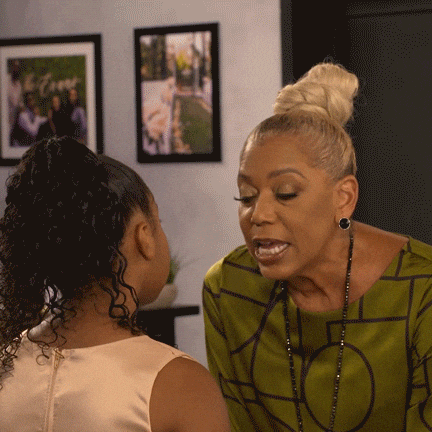 Giphy
GiphySomething that I actually get asked fairly often is, do I feel “some type of way” that I do so much work in the realm of marriage when I’ve never been married myself. The short answer is “absolutely not” because I know that I could’ve been married, a few times over, at this point; however, I am just as intentional about not wanting to be divorced as I am about being in a healthy marriage, not just “a marriage.”
I’m grateful to be in that head and heart space too; otherwise, I would be out here comparing myself to other people — and there is nothing good, healthy, wise, profitable, or beneficial about doing that. In fact, science isn’t a fan of playing the “keeping up with the Joneses” game, either.
According to science, that can ultimately do things like lower your self-esteem, cause you to only see the bad/negative things in your world (in comparison to other people), and it can jack up your perception of what’s really going on with other people. For instance, if you’re 33 and comparing yourself to your friends who are already married and parents, you might want to talk to them about what their day-to-day, beyond their IG posts, is like.
Because while prayerfully, their life is filled with many blessings, if they are being totally honest with you, they will also share that you’ve got some “pros” to your life too (honey, there are some real benefits to being single; check out “If You're Not In Love With Being Single, Ask Yourself These 6 Questions.,” “10 Bona Fide Benefits Of Being Single,” and “10 Words That'll Make You Totally Rethink The Word 'Single'”). Content people get that every season does — because it’s true.
6. You Don’t Verbalize Gratitude Often
 Giphy
GiphyThere is someone in my world who I actually try to avoid as much as possible. It’s not that she’s not smart, and honestly, she’s one of the funniest individuals that I’ve ever known (and I’ve known her for most of my adult life). It’s just that…she is always wanting something, and I find that to make her a very draining individual. Lawd, even as I am typing all of this out, I’m trying to recall a time when I’ve heard her say, “thank you” for something (no joke), let alone express any form of genuine gratitude. She’s just got such a sense of entitlement that whatever she does receive, she thinks she’s owed and what she doesn’t have, she believes that something is wrong if it hasn’t arrived yet. Geeze, what a horrible type of existence.
You don’t have to take my word for it either because there is plenty of data out here to support that people who don’t take the time to be grateful for what they have ended up being unhappy, more stressed out, in more physical pain (yes, literally) and definitely more negative than everyone else — which would explain why people don’t like hanging out with them as much.
So, since this is the time when gratitude is the theme of the season, think about what you are grateful for when it comes to what you’ve accomplished this year, then write it down and post it up somewhere. Then, as far as the individuals, for whom you are grateful for — send them a handwritten note, get them a gift card to their favorite coffee shop, or even just call to tell them.
One of the most beautiful things about being in a state of contentment is it reminds you of a lot of what you already have. It really is enough…for now…in this very moment.
7. Being (and Living) Satisfied Is a Foreign Concept to You
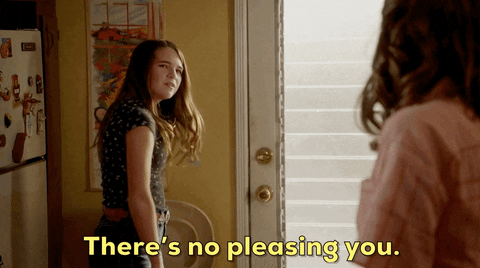 Giphy
Giphy“Tubi movies” really is a complete sentence. LOL. And yes, sometimes, when I’m taking a writing break, I will check out some of the most…I-wouldn’t-normally ones, just to lend my support. In walks Never Satisfied with its own self-explanatory meaning. Y’all, it really is oh so true that there are folks out here dealing with some unpredictable and sometimes even truly dire consequences — and it’s all because they didn’t know how to sit down somewhere and learn how to be satisfied with the people, places, things, and ideas that they already have.
That said, I am indeed a quotes gal, and one of my favorites on the topic of satisfaction is by actor Christopher Reeve: “Success is finding satisfaction in giving a little more than you take,” and although I don’t do what I’m about to do often (because I try to take Matthew 6:1-4 very literally and seriously), I’m going to illustrate what he said about satisfaction by sharing a recent situation.
This past week, a nurse practitioner (I prefer those to doctors) diagnosed me with wrist tendonitis for the first time in my life. If you knew how many keystrokes that I do a day, you’d probably be shocked that it took this long. Anyway, as I was waiting in line to get a prescription, a young Black man was basically freaking out because his insurance was refusing to cover his own meds. According to what he was telling the pharmacist, he always only pays $5; however, this time, they were charging $62, he simply didn’t have it, and the insurance company was not picking up.
As I watched him shaking and sweating while saying that he really needed it today and fretting while talking to his mom on the phone, I offered to cover it — and after going back and forth with him for about three minutes, I did. In my mind, although I didn’t plan on spending about $85 (total) that day, the little inconvenience that it was costing me was nothing in comparison to how much it was going to benefit him — I could tell from how he and his mother reacted (even the pharmacist mouthed “thank you so much”), and that is what made it money well spent.
To help someone who had no way of helping themselves in the moment? That brought me a lot of satisfaction because it’s nice to lighten someone’s load while leaving it to karma to handle it. ALL OF IT.
And that’s why I thought it was best to wrap all of this up with a reminder that being satisfied is being content. And when you can be so satisfied with your life that you want to help others? That is a level of contentment that is truly unmatched because you start looking for ways to bless others simply so that they can feel just as content as you do.
____
Our culture? It really is never satisfied, which explains why a lot of people are so miserable. SMDH. You don’t have to be like the masses, though. This Thanksgiving, please purpose in your mind (and heart) to be(come) more content. It will make you a rare gem that benefits everyone and everything around you.
Including yourself, sis. No doubt about it.
Let’s make things inbox official! Sign up for the xoNecole newsletter for love, wellness, career, and exclusive content delivered straight to your inbox.
Featured image by Shutterstock
Originally published on November 28, 2024









